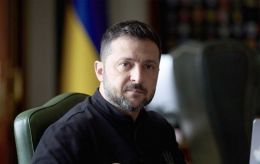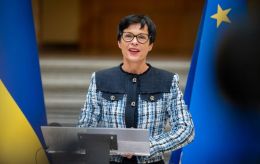Two steps forward, one step back. Will Armenia change its course from Russia to West?
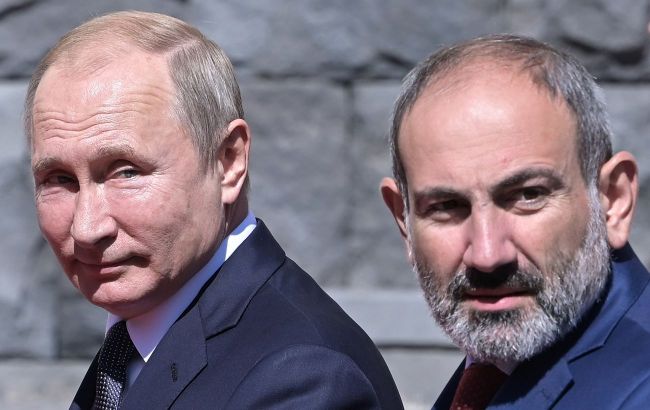 Another round of tension between Vladimir Putin and Nikol Pashinyan (Photo: Getty Images)
Another round of tension between Vladimir Putin and Nikol Pashinyan (Photo: Getty Images)
The political conflict in the relations between Armenia and Russia has entered a new stage. Armenian Prime Minister Nikol Pashinyan publicly criticizes Vladimir Putin, implying the loss of Nagorno-Karabakh due to him, demonstrating an intention to approach the West. The Russian side mocks Yerevan, warning of the risk of "stepping on Ukrainian rakes."
Does this mean a definitive exit from the Russian sphere of influence, and what is happening in the Armenia-West-Russia triangle - in the material by RBC-Ukraine.
In preparing the material, publications of the "News of Armenia" and "ArmInfo" editions and statements by Prime Minister Nikol Pashinyan, other Armenian politicians, Russian President Vladimir Putin, and representatives of the Russian Foreign Ministry were used.
Usually, Russia has been considered Armenia's main ally, starting with the role of the defender of Christians in the Ottoman Empire. Currently, a military alliance operates between the countries within the Collective Security Treaty Organization (CSTO) framework. Russian military personnel are stationed at the base in Gyumri, northwest of the country, utilizing an airfield south of Yerevan. Economic integration is carried out through the Eurasian Economic Union (EAEU).
Unofficial support during the first Nagorno-Karabakh war in the early 1990s helped Armenians retain the region. However, since the "Velvet Revolution" of 2018 brought Nikol Pashinyan to power, it is believed that Armenia began to move towards the West. Against the backdrop of Russia's full-scale invasion of Ukraine and the weakening of Russia's military capabilities, this trend has accelerated. In September, the prime minister acknowledged dependence on Russia as a strategic mistake for the first time.
"Armenia's security architecture was 99.999% linked to Russia... But today, when Russia needs weapons and ammunition, it is clear that even if it wanted to, it could not meet Armenia's security needs. This example is intended to show us that in security, dependence on or attachment to only one center is a strategic mistake in itself," Pashinyan said in a September interview with La Repubblica.
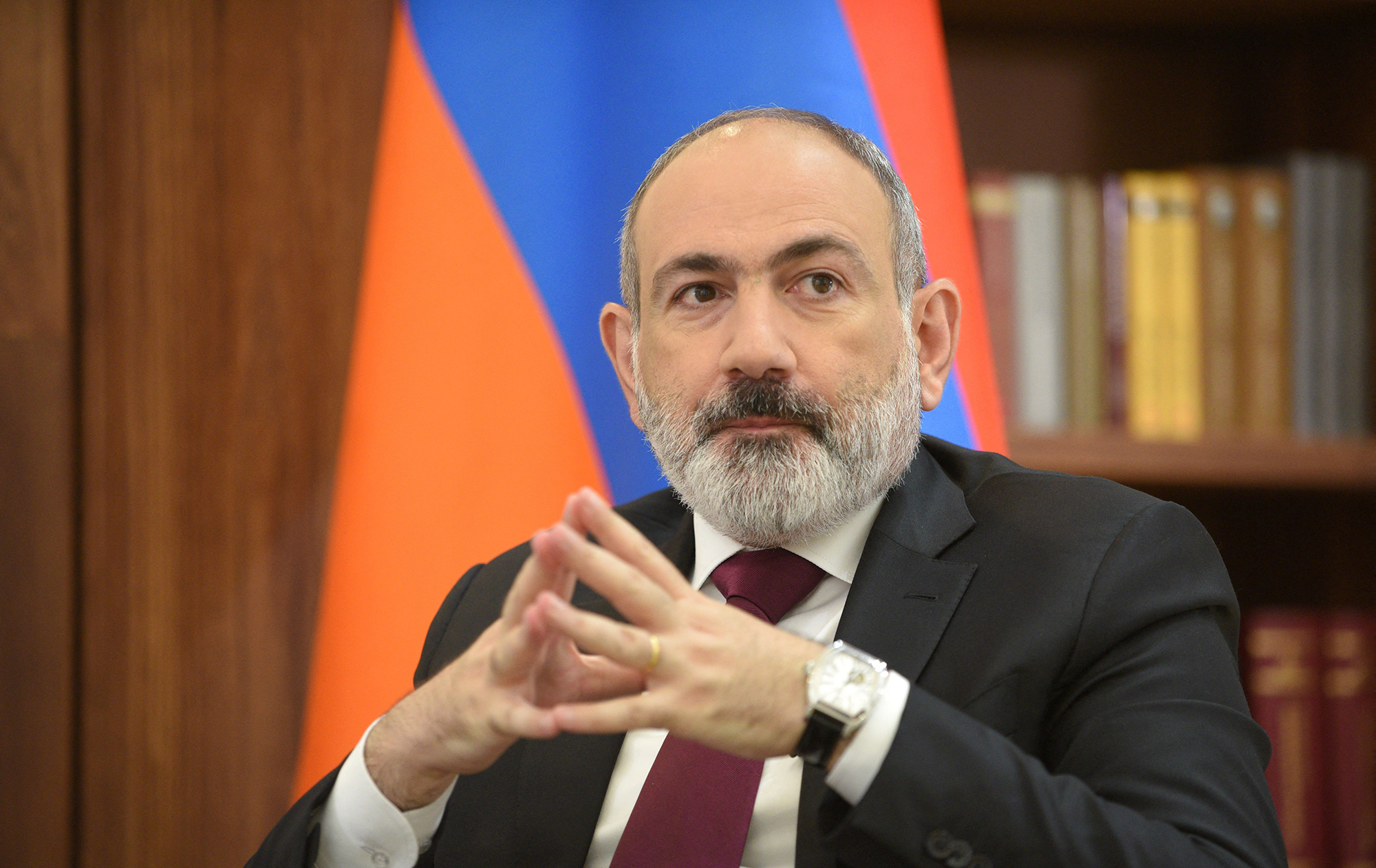
Photo: Nikol Pashinyan recognized dependence on Russia for security as a strategic mistake (Getty Images)
After Azerbaijan's swift operation on September 19-20 and the mass departure of Armenians from Nagorno-Karabakh, Pashinyan declared that Russia could not guarantee the security of his country. Recently, the Armenian leader, for the first time, practically accused Vladimir Putin of surrendering Karabakh, triggering threats from Moscow.
Pashinyan against Putin: accusations and allegations
In October 2022, at a summit in Prague (Czechia), Pashinyan and Azerbaijani President Ilham Aliyev signed a declaration acknowledging Yerevan's recognition of Baku's sovereignty over Karabakh. Putin stated in a direct line that he was "not particularly informed about the preparation for such a decision."
"We understand all this: we did not give up Karabakh; Armenia recognized that Karabakh is part of Azerbaijan, and they did it on their own initiative, actually," he said, believing that Pashinyan ignores the CIS (Commonwealth of Independent States) and CSTO summits due to internal processes rather than a refusal to continue cooperation.
In response, Russian Foreign Ministry spokesperson Maria Zakharova stated that the agreements on Karabakh within the framework of the 2020 trilateral agreement (with Putin's participation) were mainly not fulfilled by Armenia.
"Let them read and see who did not fulfill their obligations. That is, the trilateral statement of November 9 says that Azerbaijan should attack Karabakh, and Russian peacekeepers should be in shelters during this time?" Pashinyan responded.
According to him, the "peacekeepers" did not protect the civilian population during the fighting on September 19-20, although they were supposed to intervene. In addition, in an interview with Armenian Public Television, he criticized the CSTO. In May 2021, during border clashes with Azerbaijan, he requested military assistance, but there was no response. A similar request in September 2022 was also ignored.
Pashinyan believes that the inaction of the CSTO and Russia violated the Collective Security Treaty and a separate agreement with Moscow on military assistance. This fact forced his government to acknowledge Karabakh as part of Azerbaijan publicly a month later.
The Armenian prime minister did not attend the meeting of the CIS leaders in Minsk, and the December Council of the parliamentary assembly also took place without a delegation from Yerevan. Before this, Pashinyan asked partners not to take offense, stating that his country was not leaving the organization but intended to diversify security relations. The recent signals from Moscow have irritated him.
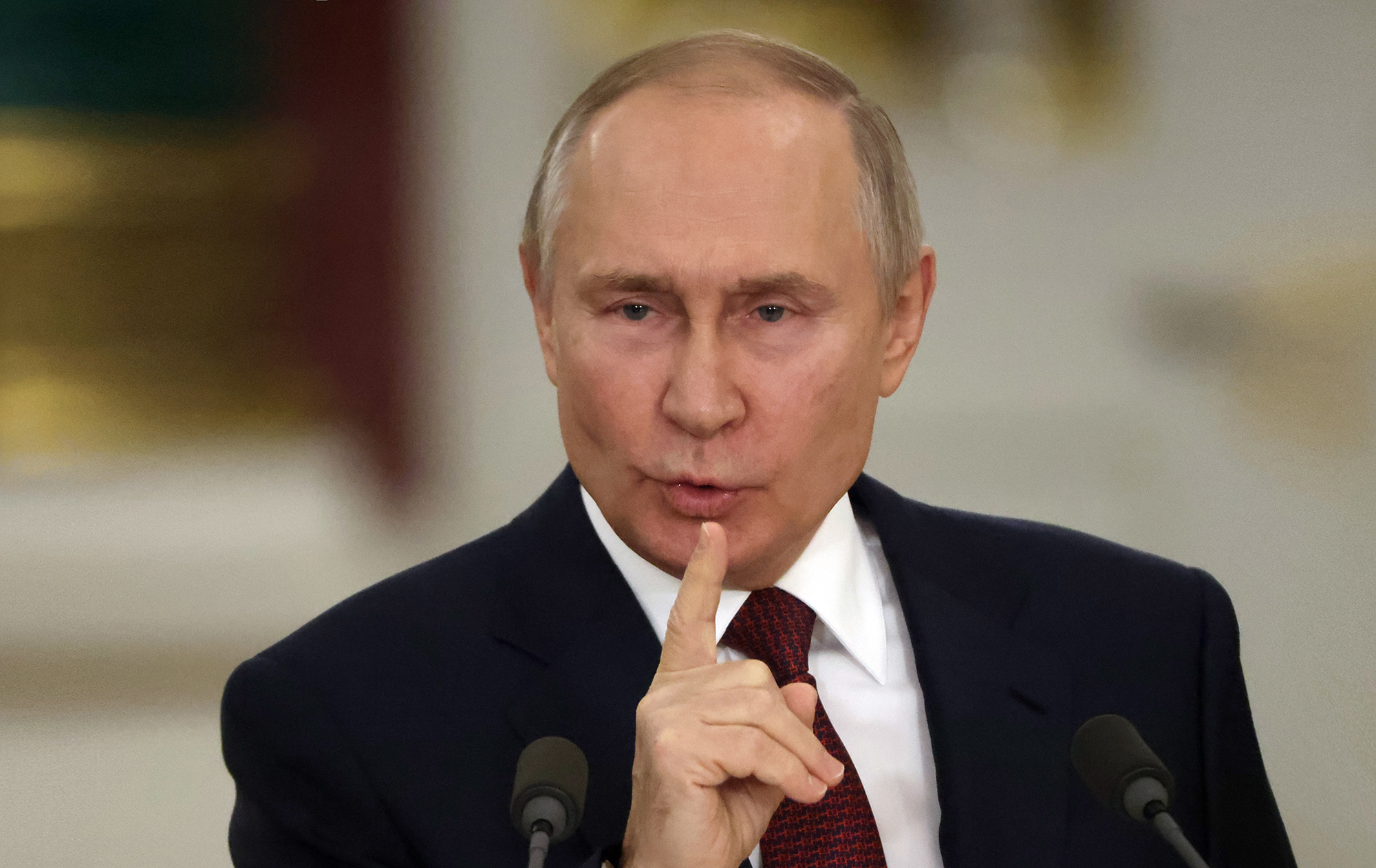
Photo: Vladimir Putin's words about Karabakh angered the Armenian authorities (Getty Images)
In the Russian parliament, they say that Pashinyan is trying to shift the responsibility for the surrender of Karabakh to Moscow. They conclude that the Armenian leadership is attempting a sharp turn towards the West.
"Thus, Yerevan risks stepping on Ukrainian rakes and sacrificing centuries-old friendly Russian-Armenian ties for the sake of Western Russophobes," warned Leonid Slutsky, the chairman of the State Duma's International Affairs Committee.
Wojciech Wojtasiewicz, an expert on the South Caucasus at the Polish Institute of International Affairs (Warsaw), considers the mutual exchange of reproaches between Armenia and Russia a political game. Regarding Nagorno-Karabakh, Pashinyan understood that the world viewed the region as part of Azerbaijan, making Russia's intervention and the CSTO impossible. However, the inaction of allies during the border clashes in 2022 became a problem from the Armenian perspective.
Criticism of Russian "peacekeepers" also extended to their inactivity during Azerbaijan's blockade of the Lachin Corridor, connecting Armenian territory with the remnants of the so-called "Nagorno-Karabakh Republic." The blockade resulted in a humanitarian crisis.
"But what could Pashinyan do? After the 2020 war, he knew that the Armenian army was fragile and couldn't win a war against Azerbaijan. Russia didn't want to sell weapons, and the Armenian government was looking for them worldwide. Still, it needs to be understood that the economic capabilities of Yerevan and Baku are incomparable," he noted in his comment to RBC-Ukraine.
According to him, Pashinyan tried everything to achieve autonomy for faithful Karabakh residents. Political discussions were off the table, so all efforts were directed at ensuring linguistic and cultural independence. Armenia wanted to involve the UN, EU, USA, and Russia in the process, but the negotiations dragged on, and as a result, Azerbaijan decided to launch its operation.
"Putin can easily say that Pashinyan gave up Karabakh, but he had no choice. He could continue to say that it is part of Armenia. But in the case of a new war, it would have suffered a 100% defeat," added Wojtasiewicz.
Turn to the West: From approaching the EU to ratifying the Rome Statute
Pashinyan's words about diversifying security relations align with reality. For example, agreements on military supplies from France have been reached. In October, Defense Minister Sébastien Lecornu announced that Paris would supply some armaments, including air defense. In November, it became known that the light armored vehicles Bastion initially planned for transfer to Ukraine, would be supplied to Armenia.
Since February 2023, a civilian mission of the European Union (EUMA) has been operating in the country. It is a neutral mission exclusively on Armenian territory with no executive function. It is designed for two years to promote stability in the border regions of Armenia and normalize relations with Azerbaijan.
In addition, there is a Comprehensive and Enhanced Partnership Agreement between Brussels and Yerevan. Pashinyan calls it one of the pillars of reforms in Armenia, expressing the desire to get as close as possible to the EU and cooperate in reforming the police, judicial system, education, and public administration.
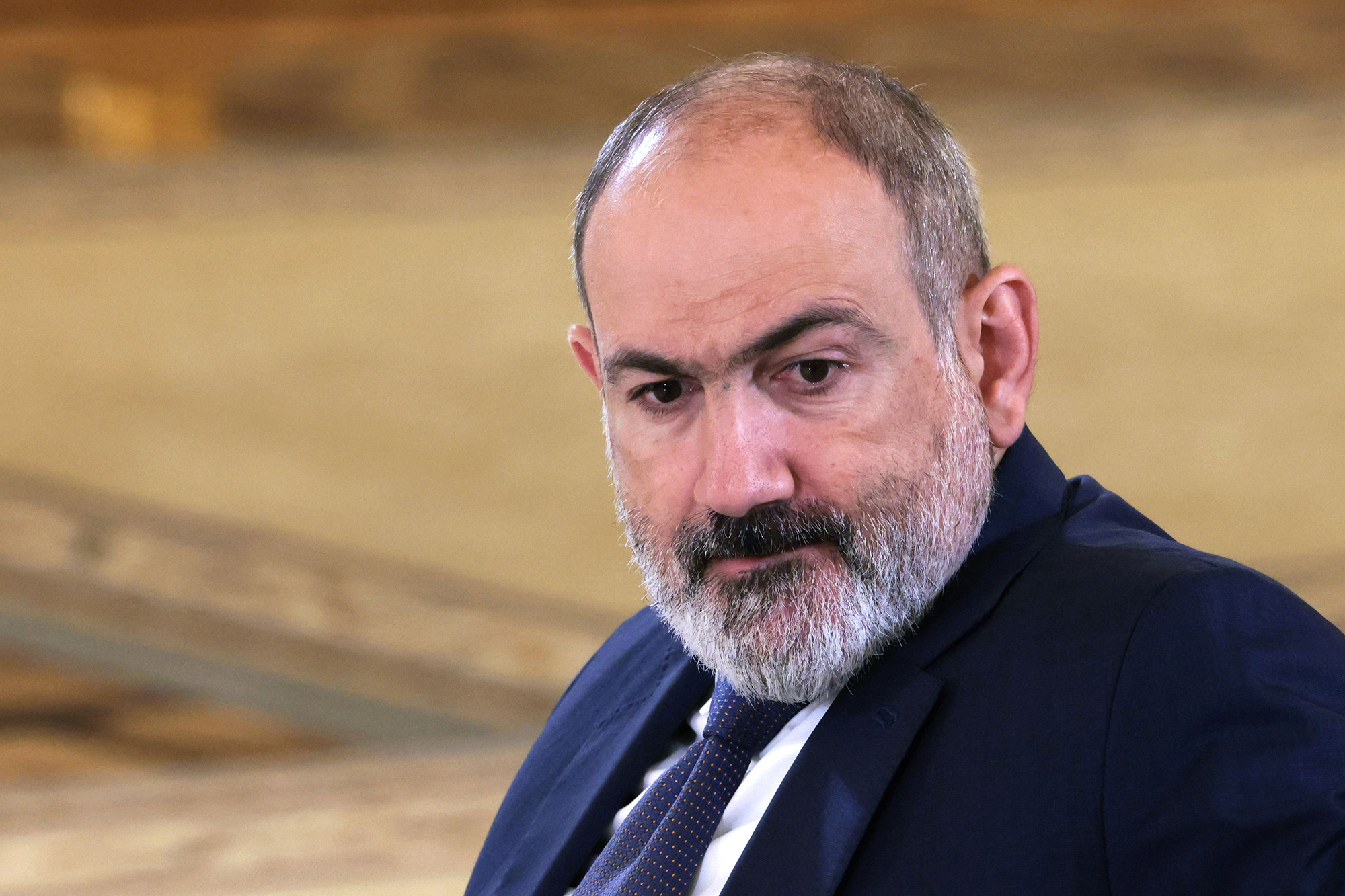
Photo: Nikol Pashinyan is increasingly talking about his desire to get closer to the European Union (Getty Images)
As a first step in strengthening cooperation, on December 11, the European Union expanded its mission from 138 to 209 individuals. On the same day, Armenian Foreign Minister Ararat Mirzoyan made a series of statements about the pro-European direction. Among other things, he stated that the decision to start negotiations on the EU accession of Ukraine and Moldova is welcomed by the government and the Armenian people. According to him, the process of democratization and reform in the country "will not stop for a moment."
But how far is Yerevan willing to go? Expert Wojciech Wojtasiewicz says the authorities want to return to signing the Association Agreement. The document was ready in 2013, but then-President Serzh Sargsyan received a call from the Kremlin, and he refused. After that, Vladimir Putin launched the Eurasian Economic Union (EAEU).
Now, the Armenian government wants a new agreement with the European Union, and the expansion of the observer mission was the first step.
"Secondly, they want to obtain a visa-free regime so Armenians can travel to EU countries without Schengen visas. They also want a free trade zone. In principle, this is the most important. Additionally, negotiations are underway with the US and France on constructing a power plant to reduce dependence on Russian resources and gas. But implementing such decisions quickly is difficult; it will take time," explained Wojtasiewicz.
Armenia's Foreign Minister separately emphasized the importance of ratifying the Rome Statute.
"By joining the International Court of Justice (ICJ), Armenia contributed to strengthening the international legal system, confirming at the same time the sovereign right to make decisions based on its national interests," emphasized Ararat Mirzoyan.
Ratifying the Rome Statute obliges compliance with the ICJ's orders. The most resonant in 2023 was the order for the arrest of Vladimir Putin for war crimes in Ukraine. However, Armenia promised not to arrest the Russian dictator upon his arrival before the final decision.
The ratification of the Rome Statute has its reasons, and it is certainly not a demonstration of readiness to arrest Putin.
"Armenia wanted to become part of the international tribunal. In the future, if Azerbaijan dares a military operation in the Zangezur Corridor, there would be an opportunity to bring Ilham Aliyev before the tribunal. Of course, if Putin flies to Armenia, no one would detain him or hand him over to The Hague," explained Wojtasiewicz to the agency.
Note that the Zangezur Corridor is a transport corridor promoted by Azerbaijan, about 40 km long, crossing the territory of the Syunik region of Armenia. It is considered a corridor to provide transportation between the western regions of Azerbaijan and its exclave, the Nakhchivan Autonomous Republic. The concept emerged after the end of the Second Karabakh War. Armenia refuses, fearing the loss of sovereignty over the southern districts of the Syunik region.
View on Ukraine: Why Pashinyan's Policy is Changing
Unsatisfied with the Kremlin and a shift in the Armenian perspective on the Russian invasion of Ukraine. If previously Yerevan preferred to refrain from specific steps, on September 6, Anna Akopyan (Nikol Pashinyan's wife) attended the summit of first ladies and gentlemen in Kyiv and delivered humanitarian aid from the Armenian government.
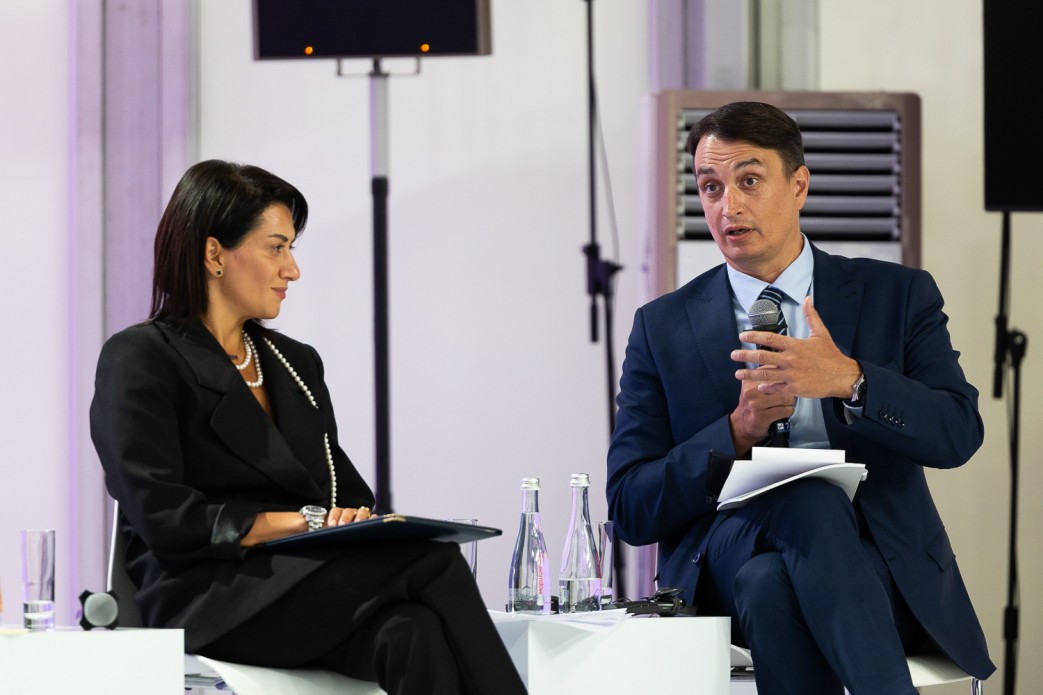
Photo: Anna Akopyan (left) at the summit of first ladies and gentlemen in Kyiv (president.gov.ua)
A month later, on the sidelines of the European Political Society summit in Granada, Spain, President Volodymyr Zelensky met with Pashinyan for the first time. The parties discussed cooperation and interregional economic projects in talks that many called historic. The participation of the Armenian delegation in the summit on the Ukrainian "formula of peace" in Moscow in Malta was perceived as an anti-Russian gesture.
"In Yerevan, they should realize this is a demonstrative flirting with those who aggressively oppose our country. It is regrettable that the current leadership of the republic deliberately and persistently undermines our allied relations," said Russian Foreign Ministry spokesperson Maria Zakharova.
In response, Armenian Deputy Foreign Minister Paruyr Hovhannisyan dismissed the accusations and noted that a broader agenda was discussed at the security ministers' platform.
Polish expert Wojciech Wojtasiewicz explains Armenia's rapprochement with Ukraine as a disappointment with how Russia treated Armenians in Nagorno-Karabakh. Furthermore, there are concerns that if Russia wins in Ukraine, the following targets could be the South Caucasus countries.
"We remember how Armenians did not like that Ukraine sold weapons to Azerbaijan. However, it seems that Pashinyan's policy depends on the sentiments of Armenian society. Currently, it is disappointed and essentially takes anti-Russian positions. Pashinyan, being a populist, also changed his position when we talk about Ukraine. And that is why Yerevan's new policy," he explained to RBC-Ukraine.
Armenian Multi-Vector Policy: Two steps forward and one step back
According to Vojtasevich, the Armenian government has not yet decided how to shape its foreign policy.
"In Yerevan, I often heard that the decision to review relations with Russia is not theirs but Russia's. After Armenians were left face-to-face with Azerbaijan in the Karabakh situation, they wanted to look towards the U.S. and European countries, not participating in the CSTO and CIS meetings. However, they have not explicitly stated an intention to leave these organizations," he noted.
According to him, unofficially, it is said in Yerevan that a year ago they talked to American and European politicians about the desire to leave the CSTO. However, the response was that the time had not come, and there was a threat of a Russian military operation in Armenia.
It is worth noting that Prime Minister Nikol Pashinyan made similar hints in November. Specifically, when asked about Armenia's continued membership in the CSTO, he stated that national interests would guide the decision.
"Our partners in the CSTO must also understand us. If being CSTO members, we cannot receive the necessary assistance and support, and membership is an insurmountable obstacle to receiving assistance from other parties, then we must make decisions based on our interests," he said.
However, many analysts in Armenia emphasize that de facto the country has already left the CSTO, Wojciech Vojtasevich reports.
"For them, reality is more important than official status. I think the Armenian government will decide to leave the CSTO when they receive strong security guarantees from the West. And the West can provide such guarantees only when Russia suffers a defeat in Ukraine. Before that, both the West and Armenia will be very cautious. Most likely, relations with Russia in 2024 will be the same as this year, within the framework of the so-called 'two steps forward, one step back' policy," the expert notes.
This formulation applies to Armenia's relations with the West as well. The multi-vector policy is explained, in part, by the Georgian example. When Mikheil Saakashvili pursued a course towards Euro-integration and in 2008, there was Russian aggression in Abkhazia and South Ossetia. Currently, Russia plays a significant role in Armenia's foreign policy. They do not share a common border, but there is a threat that if Yerevan rejects cooperation, Moscow may contribute to overthrowing the government.
"After the Azerbaijani operation in Nagorno-Karabakh in September 2023, anti-government protests took place in Yerevan. There were concerns that if the demonstrations turned into something more significant, Russia would use them to change the government," Vojtasevich added.
Last week, there was news that Armenia joined European sanctions against Russia for the "Magnitsky Act" (human rights violations) for the first time. However, the EU Council website publication was soon corrected, removing Armenia from the list.
At the same time, the broadcasting license of "Sputnik Armenia" radio was revoked. The reason was a program by Russian propagandist Tigran Keosayan, in which he accused Nikol Pashinyan of betrayal and questioned whether he would remain alive after all these events around Armenia.
Despite this, the multi-vector policy continues. Today, Pashinyan made his first working visit to Moscow in the last seven months. He will participate in the Eurasian Economic Council meeting and the informal CSTO summit there. The results of these events will likely indicate how much Armenia is moving away from Russia and how far it is willing to go in this direction.
